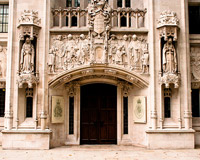 A property developer who says he bought a site in Gleneagles only because he was promised £700,000 in development funding over a phone call has triumphed in a Supreme Court showdown with lender the Royal Bank of Scotland.
A property developer who says he bought a site in Gleneagles only because he was promised £700,000 in development funding over a phone call has triumphed in a Supreme Court showdown with lender the Royal Bank of Scotland.
The Court ruled that the Second Division of the Inner House of the Court of Session had been wrong to overturn a first instance ruling in which the Lord Ordinary found that the bank was in breach of a collateral warranty to make additional funds available to William Carlyle to fund the development of the site ahead of the 2011 Ryder Cup.
Giving the Court’s ruling, Lord Hodge said that, were he deciding the matter at first instance, he might have shared the view of the Second Division that the statement relied upon did no more than communicate to Mr Carlyle that the bank had reached a decision in principle to provide funding for the development of the two plots and that the parties were required to take further steps to create a legally binding obligation on the bank to advance that funding.
However, he continued: “But deciding the case as if at first instance is not the task assigned to this court or to the Inner House.
“It cannot be said that the evidence could not support the Lord Ordinary’s view. Absent some legal error elsewhere in his reasoning, there was a reasonable basis for his finding that on an objective analysis the bank made a legally binding promise to fund the development of plot 5 in the telephone call of 14 June 2007.”
He added: “I am therefore satisfied that the Second Division did not have an adequate basis for overturning the Lord Ordinary’s findings of fact.”
He said that the Second Division had made its own assessment of what was needed in this case to create a binding contract of loan, and not addressed whether the Lord Ordinary was not justified to reach a contrary conclusion on what was an issue of fact – whether on an objective assessment the bank intended to make a legally binding promise to provide development funding.
In 2007, Carlyle purchased a plot of land for development at Gleneagles, Perthshire, from the Gleneagles Hotel. Under a buy-back clause, he had to complete the construction of a new house on the plot by 31 March 2011, before the Ryder Cup was due to be staged at Gleneagles golf course.
He funded the purchase by taking a loan from RBS and made it clear that he would need to borrow money to build the house as well as to purchase the plot, reiterating that the bank should not lend him the purchase money unless it was also committed to providing him with development funding.
He claimed that on 14 June 2007 the bank’s representative told him by telephone that his proposal was “all approved” and Mr Carlyle accordingly paid a deposit to the vendor to secure the purchase.
However, in August 2008 the bank informed him that it would not provide funding for construction and called in the loan. The bank sued him for payment of £1,449,660 plus interest, and Carlyle counter-claimed for his loss of profit on the development.
The case will now be remitted to a commercial judge in the Court of Session.
In his judgment, Lord Hodge said that the pleading of a “collateral warranty” had become a distraction in this case, and that it was not used as a term of art.
He said: “Either ‘promise’ or ‘unilateral undertaking’ would have been a suitable choice of words for the independent legal obligation which Mr Carlyle was asserting. The addition of the word ‘collateral’ while descriptive of context, would have added nothing to the legal analysis. As the Lord Ordinary said in para 37 of his opinion, there is no magic in a collateral contract. It is simply a contract which is governed by the same rules as other contracts.
“Whether one views the undertaking as a promise to provide the development funds if he purchased the plot (as I prefer) or (as Mr Dunlop QC argued) as an obligation in a bilateral contract which became binding when Mr Carlyle borrowed the purchase funds and purchased the site does not give rise to a different answer to the question: ‘did the bank intend to enter into a binding legal commitment?’.”
“In this case Mr Carlyle’s proposal to enter into a contract to purchase plot 5 and, because of the buy-back clause, his clearly expressed unwillingness to do so unless the bank provided development funding as well as purchase funding formed important elements of the factual context in which the Lord Ordinary assessed the legal nature of the bank’s statement on 14 June 2007. That was the important point. The statement that the bank would provide the development funding induced him both to contract to purchase the plot and enter into the loan agreements which funded that purchase.”
Carlyle v Royal Bank of Scotland plc Supreme Court (Lord Neuberger, Lord Kerr, Lord Clarke, Lord Reed and Lord Hodge) 11 March 2015
Roddy Dunlop QC and Alasdair N McKenzie (Instructed by MBM Commercial LLP ) for the appellant
Richard Keen QC and Alastair Duncan QC (Instructed by Brodies LLP ) for the respondent







